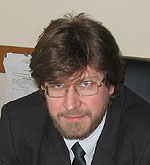
© «Russia in Global
Affairs». № 2, April — June 2005
Russia is marking two anniversaries this spring that are of
fundamental importance for its development.
Sixty years ago, Europe experienced the end of World War II, the
most catastrophic conflict in the history of the Old World. For
those who fought against Nazism, it was a fight for the survival
and very existence of their states. In the face of this challenge,
they put aside their ideological differences and mutual quarrels in
the name of a much higher goal. Today, as Russia’s Foreign Minister
Sergei Lavrov writes
in these pages, whatever may be our historical assessments of
that momentous event, we must not forget that the supreme goal was
achieved.
Russia’s second anniversary is 20 years since the beginning of
the epoch of change in the Soviet Union. In 1985, the country’s new
Secretary General of the Communist Party Central Committee, Mikhail
Gorbachev, called on the nation to “accelerate social and economic
development.” The wish to “renovate socialism” resulted in the
collapse of the Soviet system and brought about unprecedented
geopolitical changes across the globe. The scope and significance
of those changes have not yet been fully grasped to this day. This
historic anniversary has sparked heated debates as to whether
Gorbachev’s perestroika policy was inevitable. Did Russia follow
the right path? Has the country, in the final analysis, lost
or gained as a result of its decision?
From an ideological point of view, the results of the two
decades that have passed since the beginning of Gorbachev’s
reforms, and since the country opened up to the world, are rather
controversial. The direction of Russia’s strategic development, far
from becoming clearly defined, has become confused. We have
consistently discredited various kinds of development models or
declared them inapplicable due to the present conditions in Russia.
These models ranged from the futile Soviet model, to the Western
liberal model, even to the Asian authoritarian model – on which the
advocates of modernization once pinned their hopes.
Russia never made a breakthrough into the Euro-Atlantic
Community where, it turned out, nobody was waiting for it; and the
imperial project has become history once and for all. This is the
reason why, despite the favorable economic situation in the
country, Russia’s intellectual elite finds itself in a state of
confusion as it searches for new goals while trying to analyze
possible methods of development.
Our contributors offer in-depth analysis of various aspects of
the changes now facing Russia. Economist Vladimir Mau is confident that there
was no alternative to perestroika – by the mid-1980s, the Soviet
system had exhausted its potential. Political scientist Vladimir Degoyev argues
that the collapse of the system was brought about by the
irresponsible policy of the then Soviet elite, while sociologist Yuri Levada
writes that, despite the cataclysms, the essence of “Homo
sovieticus” has not changed, as it has not yet given way to a new
Russian identity. His colleague Emil Pain writes about Russia as a “decaying
empire” in search of a new development model.
The formation of a new national self-consciousness is directly
related to the processes underway in the space which Russia is
accustomed to consider its lawful zone of influence. Experts
Konstantin
Zatulin, Andranik Migranyan and Alexei Makarkin discuss the consequences that
the developments in Ukraine and Kyrgyzstan may have for Russia’s
policies. Economist Tatyana Valovaya analyzes integration prospects in the
Commonwealth of Independent States.
Researchers Anatoly Vishnevsky and Vilya Gelbras discuss Russia’s migration policy
as a factor that in the next few decades will have a strong
influence on the formation of the Russian identity.
Amidst ideological confusion in society, the victory over Nazism
is acquiring special importance – as an absolute value not subject
to erosion – which has united the nation. That is why Moscow reacts
so strongly to the increasingly frequent attempts to call into
question the results of the war. However, if we view that war not
as a feat of the people but as a political triumph of the Russian
state, we will fall into a trap: we will inevitably have to justify
Stalin’s regime – a poor foundation for the formation of Russian
identity in the 21st century.










